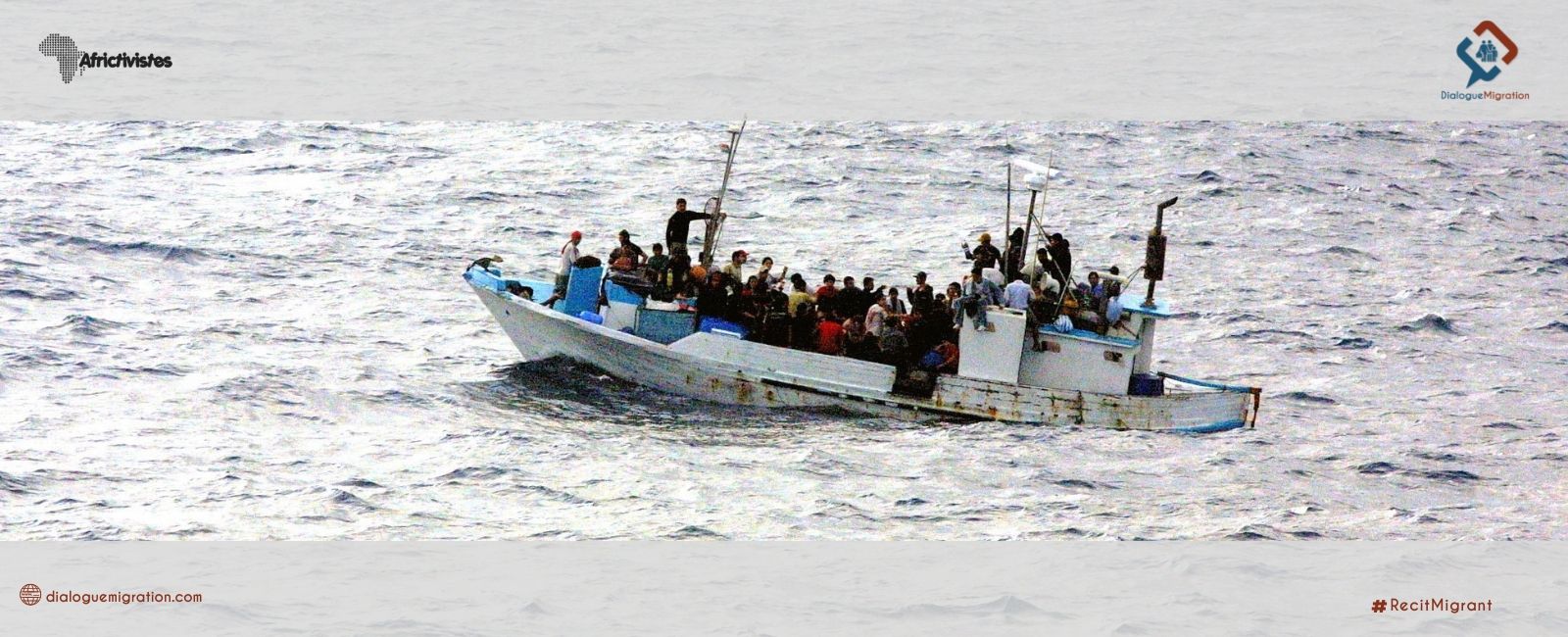

Many sub-Saharans leave the continent to join some European countries. Whether on a regular basis or not, the problem for many of them remains obtaining the right of asylum. Europe is increasingly tightening its migration policy for nationals of sub-Saharan countries.
At the same time, some asylum seekers are favored (Germany which accepts en masse, among other things, asylum applications from Syrian Afghan refugees and lags behind for sub-Saharan nationals). This, according to the rule of law, constitutes an attack on human rights or simply on human dignity.
Every day, the media shows barely bearable images of migrants dying while crossing the desert. Or makeshift boats and canoes capsizing off the coast of Europe, taking with them people who dreamed of a better life. These images demonstrate the difficulty of reaching Europe for many Africans. However, these journeys are only the tip of the iceberg, because once in Europe, migrants are not at the end of their troubles. They remain, among other things, the thorny issue of applying for asylum.
The Spanish and Italian sides are for many African migrants gateways to Europe. These countries are close to Africa and very often serve as a stopover to rally other European localities such as Germany, Switzerland, Holland, explains Da Sié De Bindouté, sociologist and journalist. Individually or collectively, some European states are working to limit the migratory flow on their territory, explains the sociologist.
“On the Italian side, the arrival of more than 600,000 migrants between 2014 and 2017 created strong pressure on the government. To respond to this, Mr. Minniti, Minister of the Interior (2016-2018), designed a strategy focused on reducing departures from Libya and a more restrictive reorganization of the Italian reception system, which showed its effectiveness from 2017 in terms of arrivals on the Italian territory,” says Aldo LIGA, analyst, in a study by IFRI.
In France, “access to the territory is increasingly difficult and procedures more complex for asylum seekers. Applications in France have halved in three years, from 50,000 to 25,000. This is the result of restrictive policies pursued by successive governments. Many pieces of legislation are responsible for this deterioration, some concerning the situation of asylum seekers on the territory, others access to asylum at the French borders,” said Patrick Delouvin, Head of the France Unit of Amnesty International’s French Section.
The book Migration Society looks back at the evolution of Spain’s migration situation from 1991 to the present day. According to the author, Jean David Sempere Souvannavong, it was from 1991, with a view to Spain’s accession to the Schengen Agreement (5 June 1991), that visas were imposed on an increasing number of foreign nationals, starting with North Africans (15 May 1991), who constituted by far the largest group of foreigners in Spain in numerical terms. By means of visas, Spain takes control of entries, followed by the appearance of pateras (the makeshift boats used by migrants).
Measures to stop the migratory flow of Africans?
The tightening of texts in order to counter migrants is due to several social factors. It is explained by the rise of the far left in Europe. There is also a lack of employment within countries but there are more and more social and economic problems, says sociologist Da Sié De Bindouté, who points out that European countries are facing an economic crisis and have difficulty satisfying their population. There is unemployment and when migrants arrive, they do not sort jobs.
For Dr. Evariste Djimasdé, a specialist in human rights and international criminal justice, the hardening has two essential messages: the first is aimed at asylum seekers and those who have remained in African countries. And this, he continues, “is done on the basis of instrumentalization of the European population against immigrants, at the same time we want to make European public opinion believe that measures are taken to ensure their safety at all levels (employment, health, violence …) indexing asylum seekers as the dangers.”
In addition to the social pretext used to stop the migratory flow of Africans, there is also the racial question. The treatment is particularly “inhuman, cruel and degrading to Africans,” says Dr. Evariste Djimasdé. Sociologist Da Sié De Bindouté believes that this is simply racism: “Europeans can accept Christian immigrants, but they do not want to see Muslims,” he argues. According to him, this is because Europeans fear repopulation by blacks.
He is convinced that the West, vis-à-vis Africa, reasons on the basis of race. This is what justifies, in his eyes, the preferential treatment granted to other non-African immigrants such as Syrians, Ukrainians… Dr. Evariste Djimasdé thinks that there is selective emotion and death at the distance that makes Europeans very sensitive and tolerant in a certain way vis-à-vis people with whom they have geographical proximity or the same skin color.
Europe is not ready to loosen the noose by opening its door to asylum seekers. On the contrary, it continues to undertake strong actions to prevent the “invaders”, say the two specialists.
These actions take the form of difficult visa requirements at the Embassy level. In these institutions, visa applicants are subjected to a series of questions. Then, they must prove that they have financial means but also justify the reasons for their trip, something that requires a lot of negotiation. It constitutes a violation of human rights when a human being is asked questions even against their privacy, says Da Sié De Bindouté who specifies: “They have financed a complex security system at the borders of Morocco and Tunisia: barbed wire and barriers have been put up to prevent people from going there. But also in the open sea, they are often prevented from reaching Europe. But if you still succeed, you will face the problem of residence papers.”
Counterproductive measures at the origin of departures
For the human rights specialist, Dr. Evariste Djimasdé, counterproductive measures such as the destabilization of Libya, the support given to dictators in Africa, the plundering of the natural resources of these countries or the maintenance of the CFA franc with its perverse effects, weigh down these countries. Thus forcing its populations to leave for other horizons. “The immigrants who go to Europe are also the result of the wars that Europeans have caused, the wars of economic and geostrategic plunder that have created disorder in some countries that have led people to migrate,” adds Da Sié De Bindouté.
With regard to respect for the rights of foreigners, it is an understatement to say that the reception conditions for people seeking asylum in these different countries are deplorable, says Dr. Evariste Djimasdé. Immigration will increase as long as these decried policies are in place, he concludes.


